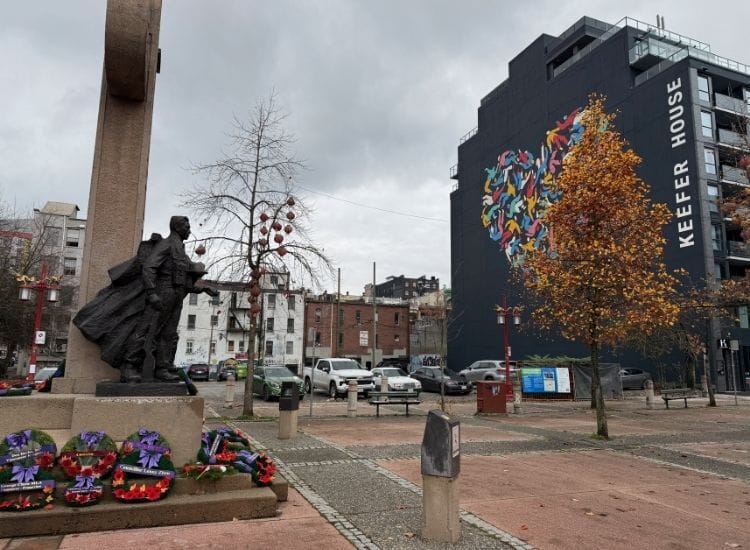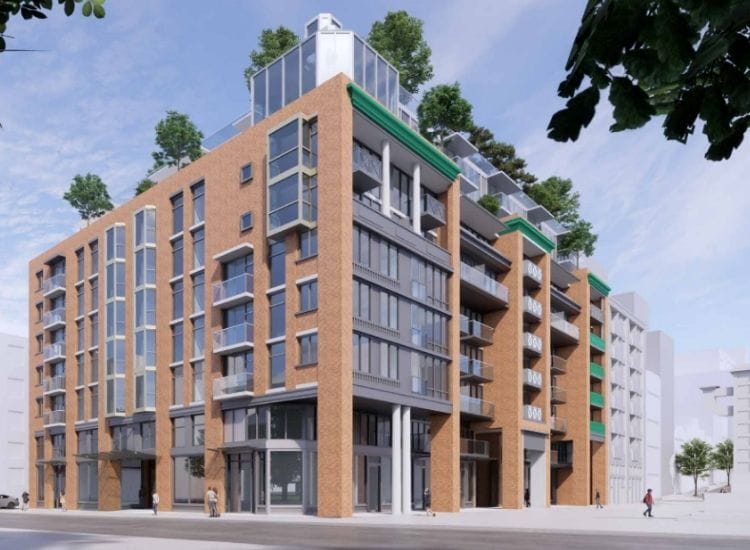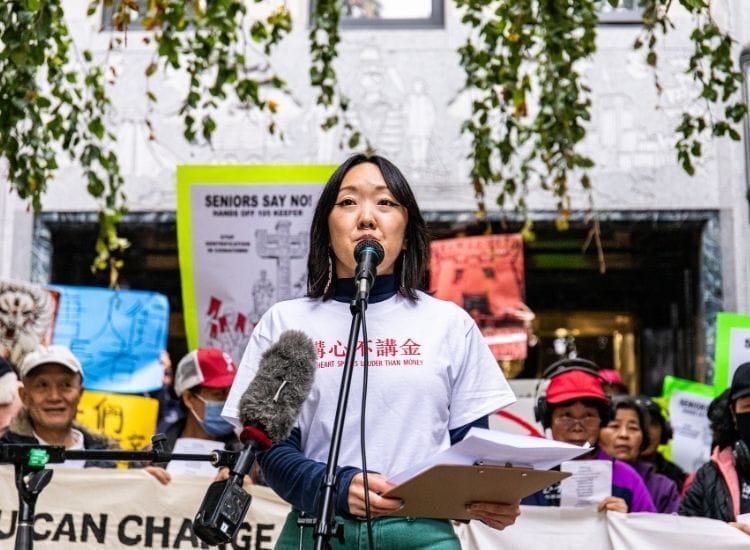- Vancity Lookout
- Posts
- Locals concerned about gentrification as contentious condo development greenlit in Chinatown
Locals concerned about gentrification as contentious condo development greenlit in Chinatown
After over a decade of debate, and a court challenge, a key site in Chinatown is permitted for a new building while neighbourhood organizers say it won't benefit community members currently living in the area.

A development in Chinatown, which has been contested for over a decade, got its final go-ahead from the city this week.
The site is an important cultural location in Chinatown where people gather, dance, and play mahjong, and a market-rate condo development exacerbates the gentrification already being felt in the neighbourhood, said Jade Ho, a community organizer in Chinatown who has been part of opposition to the 105 Keefer project for a decade.
“For the community, this was a catalyst fight,” Ho told Vancity Lookout, describing the proposed development as one element of the “sweeping gentrification” in Chinatown that’s seen tall new apartment buildings go up along Main Street over the last 15 years, while affordable grocery stores and culturally appropriate small businesses are pushed out.
Despite continued opposition, the city’s development permit board unanimously approved revised plans from development company Beedie to construct a nine-storey building with 111 condo units, retail shops, and underground parking. The plans also call for an interior courtyard, which will be publicly accessible during daytime store hours, and a social services centre.
The site in question is currently a vacant lot situated on the corner of Keefer and Columbia streets. It’s a central nexus on the south side of Chinatown in close proximity to Dr. Sun Yat-Sen Garden, the Chinese Cultural Centre, Andy Livingstone Park, and the city-owned Chinatown Plaza.
The site, which was previously referred to as 105 Keefer, though the official address is now 570 Columbia, sits directly in front of the Chinatown Memorial Monument and public square. The monument – currently festooned with Remembrance Day wreaths bearing the names of elected officials and Chinese cultural and business organizations – was erected in 2003, and features statues of a railway worker and World War II to commemorate the sacrifices made by Chinese Canadians.
The square is currently undergoing a redesign process led by the city, and Beedie’s plans indicate that a service road cutting between the square and 105 Keefer will be removed. The city has yet to release its preferred design option for the updated square, but its presence is a significant factor in the site's importance.
The site has a contentious history. After acquiring the site in 2013, Beedie applied to rezone 105 Keefer for a 12-storey residential building, which was denied by city council in 2017. Later that year, the city’s development permit board denied Beedie’s application to develop a nine-storey building on the site, a proposal that was in line with area zoning at the time. Senior city staff on the permit board denied the application due to design elements that didn’t match the area’s cultural context or interact appropriately with the nearby plaza space.
Gil Kelley, the city’s former GM of planning who stepped down abruptly in 2021, refused the application due to the design issues at “such an important site.” If they were to reapply, Beedie’s project team would “really need to listen to and engage the community more deeply than they have so far,” Kelley remarked at the time.
That rejection led Beedie to take the city to court for judicial review. The 2022 BC Supreme Court ruling described the city’s decision as “highly unusual,” and the judge ultimately ruled that the city must reconsider the development, saying the board’s reasons for its 2017 decision were inadequate.
In that context, the approval this week was ultimately the expected outcome, Ho said.

Rendering of the proposed project, looking east / James K.M. Cheng Architects Inc. for Beedie
The project has received public support from prominent Chinatown organizations, including business groups, the society that oversees the neighbouring Dr. Sun Yat-Sen Gardens, and the long-standing Chinese Benevolent Association of Vancouver.
In 2023 an open letter from those groups in favour of the project pointed to the benefit of adding housing without any displacement and that “more feet on the street will help reverse the descent of the district into further street disorder,” according to a report from CBC.
Almost all the organizations that signed the open letter in support of the project were opposed to it back in 2014, Daily Hive reported in 2023. However, “much has changed since then and today, we stand united in support for this project, and for the continued renewal of Chinatown; this important, historic, and cultural jewel in our City,” Chinatown BIA president Jordan Eng stated in the letter.
Beedie was “extremely pleased” with this week’s decision and is “invested in preserving Chinatown's character and ensuring its future as a safe and vibrant community,” Curtis Neeser, Beedie’s executive vice president of residential development, told Vancity Lookout moments after Monday’s ruling.
“This project won't address everyone's concern across the board… the topic of gentrification is such a big topic, and we've heard that, and we are concerned about it also, and we want to be a positive contribution to Chinatown,” Neeser said, adding that there isn’t a timeline for when Beedie expects to break ground on the development.
“These homes are not for Chinese youth or Chinese seniors, because none of us can actually afford it… there's no way we can afford market housing,” Ho said, following the decision.

Jade Ho speaks in front of City Hall at a rally opposing the project on October 20 / Gudrun Wai-Gunnarsson
Remi Landry Yuan agreed, saying there’s a need for more affordable housing, and what’s being proposed is not in line with the community that’s in Chinatown right now. Yuan is a board member with Chinatown Today, a group that shares past and present stories of the neighbourhood and community.
“We have a lot of people living in social housing and people living in SROs. We have youth who can't afford these types of units. We don't want to just have an empty lot the way it is now, that's not helpful for us or for anyone. We want something, but it [should be] for the people who are there right now,” Yuan told Vancity Lookout.
The 2017 rezoning application that was denied by the city did include a proposal for 25 units of social housing earmarked for seniors, but those units were removed from the application that was eventually approved.
Yuan was part of the large group of speakers and organizers who showed up at City Hall this week to speak against the proposal. In total, more than 100 people registered to speak to the permit board, which had to add an additional hearing date due to the number of speakers. This final stage of city permitting, a decision on the revised building plans, was limited to technical design issues.
“A big part of [organizing] is helping community members of all ages understand what this process even is,” Yuan said. “The big question for this development is not the technical aspect, but it's a matter of how it impacts the community socially.”
Despite the outcome, Ho said the continued organizing around the project has been meaningful and energizing.
“Every single time when we organize around 105 Keefer, you see the community coming back together in such strong and collective care for each other. Our campaign is really intergenerational. It's really helping us to be able to build stronger relationships with each other,” Ho said.
“It shows that there's fire in Chinatown,” Yuan added.
“We know that our goal is not just this one building. Our goal is to defend our neighbourhood … to make sure that Chinatown is truly affordable for people to be able to stay and live there,” Ho said. “I think this just motivates us to build something even stronger.”
Next month, Ho said she and others plan to support Downtown Eastside residents at the public hearing on significant changes being proposed to zoning rules there. “Chinatown and the Downtown Eastside, we are not divided. We actually are one neighbourhood together,” Ho said. “To build solidarity and support each other whenever it's needed is really important.”